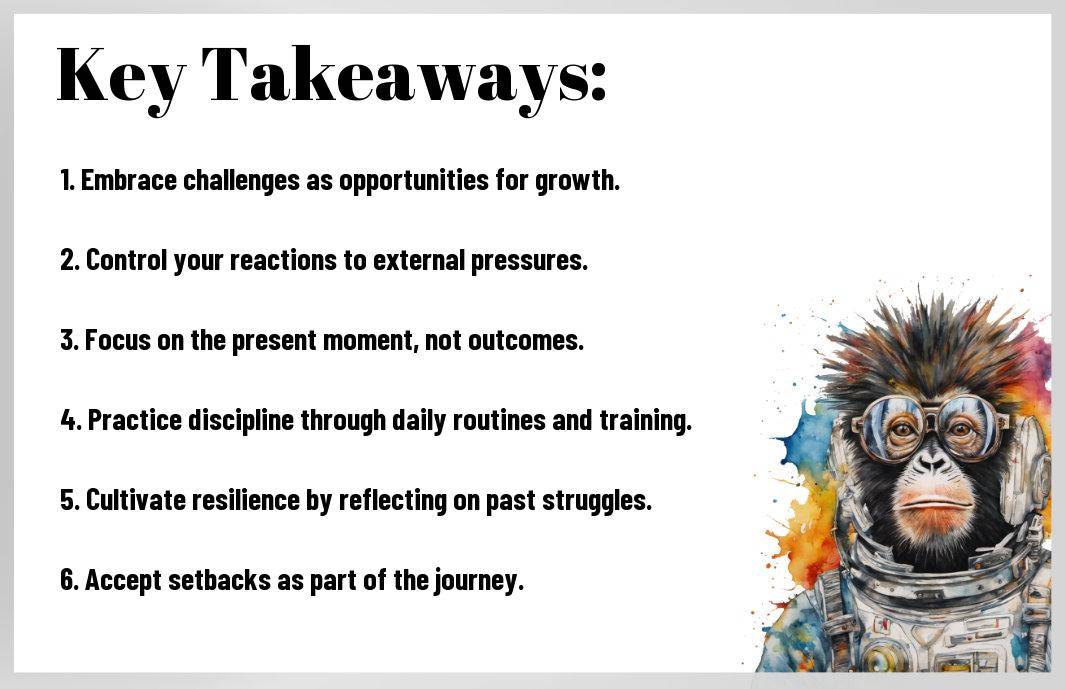
Newsletter Subscribe
Enter your email address below and subscribe to our newsletter

Enter your email address below and subscribe to our newsletter

Just like honing your physical abilities, developing mental toughness is key to success as an athlete. I often turn to the ancient philosophy of Stoicism for guidance, as it offers invaluable insights on resilience and focus. In this post, I’ll share how you can incorporate Stoic principles into your training regimen to enhance your performance and overcome obstacles. Let’s explore how this timeless philosophy can help you build a stronger, more resilient mindset for competition and beyond.

Your journey in athletics is not just about physical prowess; it’s also about mental endurance. To truly unleash your potential, it’s imperative to grasp the fundamentals of Stoicism. This ancient philosophy teaches us to maintain a level-headed perspective, allowing us to face challenges with grace and resilience. By understanding Stoicism, you lay the groundwork for a mindset that not only survives the pressures of competition but thrives in them. You’ll find these principles crucial for overcoming obstacles and refining your focus amidst distractions.
Across history, Stoicism has emphasized the importance of resilience in the face of adversity. The teachings of great Stoic philosophers like Seneca and Epictetus highlight the necessity of accepting life’s challenges while controlling our reactions. This philosophy encourages you to view difficulties as opportunities for growth rather than insurmountable barriers. By embracing this mindset, you can shift your focus from what you cannot control to what you can influence, bolstering your mental strength during tough competitions or training sessions.
Philosophy often provides the foundation for effective action, and Stoicism offers key principles that are incredibly beneficial for athletes. Central to this philosophy is the concept of focusing on what you can control—your effort, preparation, and mindset. Recognizing that external factors, such as competition outcomes or the judgments of others, are often beyond your influence can empower you. This awareness not only reduces anxiety but also sharpens your focus on your personal growth and performance.
Indeed, by internalizing Stoic principles, you can transform your approach to training and competition. Techniques such as negative visualization help you appreciate your current situation, preparing your mind for any challenges that may arise. Furthermore, practicing mindfulness encourages you to stay present, allowing you to apply yourself fully in the moment regardless of past failures or future uncertainties. In establishing these strategies, you are not just preparing for athletic endeavors; you are cultivating a resilient mindset that can enhance every aspect of your life.
Even in the world of sports, mental toughness is often misunderstood. I believe it goes beyond just being physically strong or toughing it out during grueling training sessions. It’s about your ability to stay focused, be resilient, and maintain a positive mindset when faced with challenges. Mental toughness means having the inner strength to push through adversity and stay committed to your goals, regardless of what obstacles come your way. It’s the difference between an athlete who gives up at the first sign of struggle and one who continues to fight for victory even when the odds are against them.
Behind this concept lies an intricate blend of mental skills and attributes, including confidence, self-discipline, and motivation. I often find that mental toughness is about how you approach pressure situations, how you interpret setbacks, and how you manage your emotions on and off the field. It acts like a mental shield that protects you from distractions and negativity, allowing you to perform at your best even in the toughest conditions. It’s not a fixed trait; instead, I think of it as a skill you can work on and develop over time.
Explained simply, mental toughness is vital in sports because it directly influences performance under pressure. In competition, there are moments when everything seems to be on the line—whether it’s a last-second shot in basketball or a crucial race in track and field. Your mental toughness helps you remain calm and focused, allowing you to execute your skills effectively even when anxiety might otherwise take over. When you cultivate this strength, you not only improve your own performance, but also inspire your teammates to rise to the occasion.
This ability to stay mentally strong can set you apart from your opponents. Athletes with high mental toughness often experience fewer performance dips, bounce back quickly from mistakes, and maintain a competitive edge. It fosters a powerful resilience that allows you to embrace challenges as opportunities rather than threats, ultimately contributing to greater success in your sporting journey. Cultivating this mental skill can be the key that unlocks your potential as an athlete.

To truly harness the power of Stoicism in athletic training, I find that embracing the inevitable challenges we face is key. As athletes, we often encounter obstacles that test our physical and mental limits. Rather than shying away from these difficulties, I’ve learned to view them as opportunities for growth. Every setback or uncomfortable moment serves as a training ground for resilience. When I approach practice with the mindset that every challenge is a chance to strengthen my character, I become more prepared to tackle both my athletic pursuits and life’s other hurdles.
Any athlete knows that the path to success is laden with challenges. When I face tough training sessions, unexpected plateaus, or even injuries, I now see these moments as intrinsic parts of my journey. Instead of becoming frustrated, I remind myself that discomfort is an crucial component of improvement. By accepting that challenges will arise, I cultivate patience and perseverance, leading to not just better performance, but also a more robust mental outlook. When these challenges present themselves, I find comfort knowing that they offer a chance to sharpen my skills and deepen my resolve.
Across my training, I’ve realized that maintaining focus and discipline is fundamental to aligning my athletic goals with my Stoic principles. A disciplined approach keeps me grounded and on-task, allowing me to devote my energy to what truly matters. I prioritize each workout and dietary choice, understanding that small, consistent actions compound over time. This commitment to focus allows me to drown out distractions and maintain my energy on the present moment. When I recognize that external chaos is outside my control, I can dedicate my attention entirely to my performance, increasing my chances of success both in sports and in life.
Focus is more than just concentrating on your training; it’s about creating an environment that supports your goals. I make deliberate choices about my training schedule, ensuring that I set aside time for recovery and mental preparation. By eliminating distractions and honing in on my objectives, I empower myself to push through challenging moments. The discipline I cultivate in this focus not only enhances my athletic performance, but also spills over into all other aspects of my life, helping me build a mindset that thrives on resilience and commitment.
Many athletes face moments of defeat and disappointment, yet it is during these times that the Stoic mindset can truly shine. Embracing adversity allows us to nurture our mental toughness and emerge stronger. By shifting our focus from what we cannot change to what we can control, we step into a powerful position that cultivates resilience and growth. When setbacks arise, I often reflect on the Stoic teachings that emphasize acceptance and adaptability, transforming hardship into a stepping stone for future success.
Stoic philosophy teaches that setbacks are not just obstacles; they are opportunities for reflection and growth. When I experience a loss or failure, I make it a point to analyze what went wrong without letting my emotions cloud my judgment. This introspection allows me to identify lessons that I can carry forward into my training and performance. By embracing a growth mindset, I learn to see mistakes not as failures, but as invaluable experiences that contribute to my overall journey as an athlete.
About being an athlete, I’ve come to realize that many things are beyond my control, from the weather conditions to the decisions made by judges. Rather than stressing over these elements, I focus on what I can influence: my preparation, my attitude, and my responses to challenges. By narrowing my attention to my actions and mindset, I cultivate a sense of internal stability that empowers me even amid external chaos. This allows me to compete with clarity and purpose, no matter the circumstances.
Hence, understanding the concept of controlling the controllable provides a foundation for my mental toughness in sport. It encourages me to let go of worries that serve no purpose and instead invest my energy into areas where my efforts can genuinely make a difference. This clarity not only enhances my performance but also contributes to my overall well-being, allowing me to face life’s challenges with a Stoic perspective. In the grand scheme of things, it’s all about shifting my focus to the actions and attitudes I can manage and leaving the rest to circumstances beyond my reach.

Now, to truly harness the power of Stoicism in your athletic journey, it’s vital to commit to a daily practice. Integrating Stoic principles into your daily routine not only enhances your mental toughness but also boosts your focus and resilience. By cultivating a consistent practice, I find that I am better equipped to face the challenges of competition, training, and life in general. It’s all about creating a space in your day where you can reflect, reevaluate your goals, and set the stage for a strong mindset.
Between rigorous training sessions and intense competitions, it can be tricky to fit in time for self-reflection. That’s why I believe it’s vital to establish small, manageable habits that you can stick to daily. Whether it’s setting aside just five minutes in the morning to embrace a Stoic quote or practicing mindfulness during your workout, these little moments can significantly impact your mental strength. I made it a habit to incorporate intentional breathing exercises before and after each training session, allowing myself to center my thoughts and stay grounded.
Stoic philosophers emphasized the importance of self-examination, and I’ve found journaling to be an effective tool for fostering that practice. Each evening, I take a moment to jot down my thoughts, feelings, and experiences from the day. I ask myself questions like, “What challenges did I face today?” and “How did I respond?” This reflective practice provides me with insights into my performance, both as an athlete and an individual, paving the way for growth and improvement.
In addition to tracking daily experiences, journaling allows me to articulate my goals and reminders of Stoic wisdom. I often reference lessons from great Stoics like Marcus Aurelius, which not only help to foster a sense of purpose but also guide my mindset in training and competition. This habit creates a powerful dialogue between my emotions and rational thought, equipping me with the tools to embrace challenges and setbacks with grace and determination.
All around us, we can find inspiring tales of athletes who have turned to Stoicism to bolster their mental fortitude and help them navigate the ups and downs of competitive sports. These individuals not only excel on the field but also use Stoic principles to guide their actions, reactions, and mindset. I find it remarkable how Stoicism has enabled them to maintain focus and composure in the face of adversity, showing us that success is often more about mental resilience than physical prowess alone.
Resilience is a defining trait of athletes who have come to embody Stoic philosophies. Just think of basketball legend Kobe Bryant, who famously described his approach to the game as a relentless pursuit of self-improvement. He often mentioned the importance of focusing on the process rather than the outcome, which aligns beautifully with Stoic teachings. Similarly, Olympic swimmer Michael Phelps has embraced Stoicism to manage pressure and setbacks, reinforcing the idea that our thoughts and attitudes can shape our experiences and performances. Their stories illustrate how adopting a Stoic mindset can lead to extraordinary mental strength.
Stories like those of Bryant and Phelps remind us that embracing Stoicism can fundamentally change our perspective, not only in sports but also in everyday life. These athletes have shown that by internalizing the core tenets of Stoicism—accepting what we cannot control and focusing on our responses—we can cultivate a more robust mental framework. Their journeys highlight the idea that even in the fiercest competition, the true battle often lies within ourselves.
Due to their experiences, it becomes clear that Stoicism provides invaluable lessons for all of us. As I reflect on their honed mental resilience, I see the potential for such principles to foster personal growth, whether on the track, field, or in daily challenges. It’s a gentle reminder that every setback offers a chance to build our strength and character, paving the way for future success.
Ultimately, as I investigate into the principles of Stoicism, I’ve discovered how beneficial they can be for building mental toughness as an athlete. Embracing challenges, focusing on what I can control, and maintaining a strong mindset during tough times have transformed my approach to both training and competition. By integrating these timeless teachings into your routine, you can foster resilience that propels you forward, regardless of the hurdles you encounter in your athletic journey.
If you’re looking to enhance your mental strength and performance, I encourage you to explore The 12 Stoic Principles Every Athlete Needs To Win (In …. By applying these concepts, I truly believe you can unleash your potential and thrive in your sport. Let’s embrace the wisdom of Stoicism together and face every challenge head-on with courage and determination.
A: Mental toughness refers to an athlete’s ability to stay focused, resilient, and committed in the face of challenges and adversities. It helps athletes perform consistently under pressure, manage stress effectively, and maintain motivation. Building mental toughness is crucial for achieving peak performance and overcoming obstacles in training and competition.
A: Stoicism teaches individuals to focus on what is within their control and accept what is not. By adopting a Stoic mindset, athletes can better handle setbacks, criticism, and the unpredictability of competition. Stoicism promotes emotional resilience, which is key for maintaining composure and discipline, thereby enhancing overall mental strength.
A: Athletes can utilize several Stoic techniques such as negative visualization, where they envision worst-case scenarios to lessen fear of failure; practicing mindfulness to stay present during competition; and journaling to reflect on their thoughts and feelings. These strategies help in fostering a stronger mental approach and better emotional regulation.
A: Visualization is a powerful tool that athletes can use to prepare mentally for competitions. By imagining themselves facing challenges and executing their strategies successfully, athletes can reinforce their confidence. This practice aligns with Stoic principles by allowing athletes to mentally rehearse their responses to adversity, thus building preparedness and resilience.
A: Yes, Stoicism can significantly help athletes manage performance anxiety. By focusing on what they can control, such as their preparation and effort, and accepting uncertainty in outcomes, athletes can reduce anxiety. The Stoic practice of reframing thoughts also encourages athletes to view performance as an opportunity to learn rather than a high-stakes final judgment.
A: Self-reflection is vital for building mental toughness, as it allows athletes to critically assess their thoughts, behaviors, and emotional responses. Through journaling or meditation, athletes can identify patterns and areas for growth. Stoicism encourages this practice, promoting awareness and understanding that lead to greater mental resilience and improved performance over time.
A: To incorporate Stoicism into your training, begin by integrating daily Stoic principles through reading, journaling, or mindfulness practices. Set aside time to reflect on your athletic experiences, identify areas of emotional response, and think about how you can apply Stoic teachings to those situations. Gradually, you’ll find that Stoicism enhances your approach to challenges in sports and life.